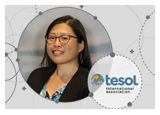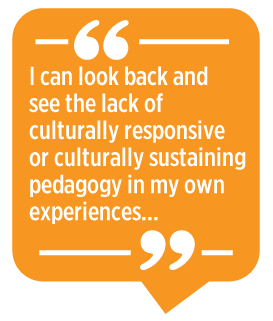|
 I’m originally from Memphis, Tennessee, USA where
my great-grandfather moved after immigrating to North Little Rock, Arkansas. I
come from a multigenerational immigrant family. My great grandfathers,
grandparents, and father immigrated to the United States over the years. I
identify as a fourth/second-generation Chinese American from the U.S. South.
Unfortunately for me, it means I grew up somewhat detached from my cultural and
linguistic heritages. I didn’t understand or recognize the differences of high-
and low-context cultures or the differences of collectivist versus
individualistic perspectives clashing in my house. I didn’t recognize my father
as a bilingual, bicultural person and how that shaped the way he communicated
with his third-generation Chinese American wife and four very American
children who were monolingual English speakers. I’m originally from Memphis, Tennessee, USA where
my great-grandfather moved after immigrating to North Little Rock, Arkansas. I
come from a multigenerational immigrant family. My great grandfathers,
grandparents, and father immigrated to the United States over the years. I
identify as a fourth/second-generation Chinese American from the U.S. South.
Unfortunately for me, it means I grew up somewhat detached from my cultural and
linguistic heritages. I didn’t understand or recognize the differences of high-
and low-context cultures or the differences of collectivist versus
individualistic perspectives clashing in my house. I didn’t recognize my father
as a bilingual, bicultural person and how that shaped the way he communicated
with his third-generation Chinese American wife and four very American
children who were monolingual English speakers.
These experiences and realizations have shaped the
way I approach my teaching, research, and professional service. I can look back
and see the lack of culturally responsive or culturally sustaining pedagogy in
my own experiences with schooling as a young learner. This is part of the
reason I am passionate about examining language education through critical,
intersectional, and relational lenses.
The year after I completed my master’s degree, I
joined TESOL International Association as a young professional. A year later, I
volunteered to serve on the Diversity Committee. I learned a lot about the big
picture of the association, expanded my network, and benefited from informal
peer mentoring. Because of this experience, I always encourage other members to
volunteer. You don’t have to wait for years before you volunteer.
 Becoming more involved in interest sections (IS)
was really the best way that I made the most of my membership. I was elected
chair of the Social
Responsibility IS. I appreciate the flattened hierarchy of leadership
in this member community because I had incredible access to historical
knowledge and support from other Social Responsibility IS leaders, present and
past. Through this experience, I learned more about the big picture of the
association from a different perspective. I also strengthened my skills in
collaboration by working with several other member communities to facilitate
panel presentations. Becoming more involved in interest sections (IS)
was really the best way that I made the most of my membership. I was elected
chair of the Social
Responsibility IS. I appreciate the flattened hierarchy of leadership
in this member community because I had incredible access to historical
knowledge and support from other Social Responsibility IS leaders, present and
past. Through this experience, I learned more about the big picture of the
association from a different perspective. I also strengthened my skills in
collaboration by working with several other member communities to facilitate
panel presentations.
When the Diversity & Inclusion Committee
was sunset, I met with members from across ISs, (then) forums, and committees
to create a TESOL Diversity Collaborative. It was an informal group working for
diversity through a critical lens, which eventually applied to become a forum
and then the TESOL
Diversity Collaborative Professional Learning Network (PLN). As I
started my volunteer work on the Diversity Committee, I remained
committed to working on equity issues. Volunteering to work within a PLN has
both similarities and differences to working in an IS or committee. Both are
great ways to make connections to like-minded professionals. Unlike ISs, PLNs
are not part of TESOL’s governance structure, but they tend to have more
diverse leadership structures than ISs.
One of the task forces that I worked on focused on
ISs. We found that the majority of participants in our member survey were not
part of an IS and/or didn’t know what an IS was. Based on our sample, it turned
out that the largest “member group” in the association was members who didn’t
have an IS. This experience has helped inform the way I think about belonging
and engagement within the association at different levels.
I later served as a member of the Nominating
Committee (NomCom). I think the NomCom is a little bit of a mystery to some
members. This is the committee that is primarily charged with encouraging
people to apply for leadership positions and vetting applicants to create the
annual ballot for the NomCom, board of directors, and president-elect. Because
of this, the NomCom has power to influence making changes at the top leadership
levels. Serving on this committee as a member and later as the chair and past
chair, I became more familiar with both the opportunities and challenges of
leadership at these levels. I especially learned better how the TESOL staff
work together with the executive director and the board.
I am still in the midst of my first year on the
board of directors and am open to learning and seeing where this journey is
going. To conclude, I hope you feel free to reach out to me and share a little
of your own journey. I spend a lot of time reflecting as part of my
professional practice and welcome your reflections, too. Maybe you have found
something in my experiences that stood out to you, made you feel a connection
to something, or left you pondering something new. I have a few short
acknowledgments and reflections for leadership.
-
For past leaders: Thank you for your dedication
and contributions to the field and the association. I know it’s currently
difficult to find recognition of members’ past service, but I hope that is
something we can work on as an association.
-
For current leaders: Actively seek out and
invite others to collaborate. Let me also personally thank and acknowledge you
and the time, consideration, and professionalism you bring to your
volunteerism.
-
For future leaders: If you’re interested in
volunteering, just try it. If you feel nervous about serving, don’t worry. You
can do it! You’ll find new connections and mentors along the way. A thanks in
advance to you for your service!
Elisabeth L. Chan has more than 15 years of experience as an English language educator. She currently teaches English as a second language at Northern Virginia Community College. She holds a PhD in multilingual multicultural education and interdisciplinary perspectives and social policy. She has presented, researched, and published on issues of social justice in education through a critical lens and challenging anti-Asian hate, where she draws upon her lived experiences as a second/fourth-generation Chinese American from the U.S. South.
|